content of level

Description of God
'God' in English is 'Allah' in Arabic. He is the Lord of Abraham, Moses, Jesus, and Muhammad.
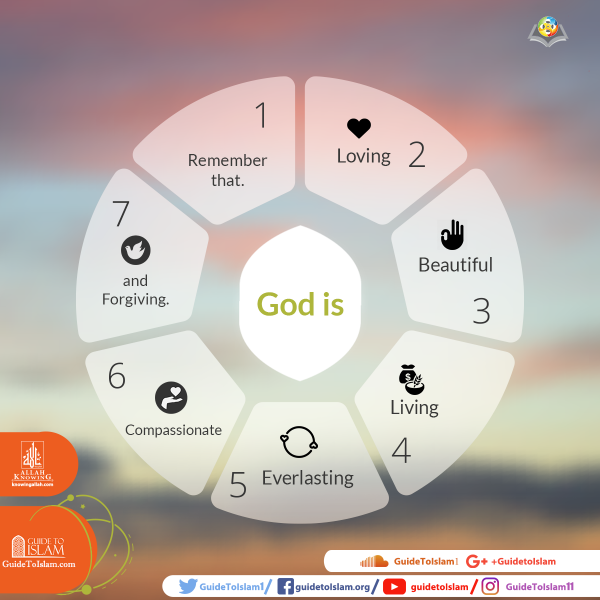
Description of God
God is Loving, Beautiful, Living, Everlasting, Compassionate, and Forgiving. Remember that.

Results of the Spread of Promiscuity and Fornication
Results of the Spread of Promiscuity and Fornication: _The Spread of dangerous diseases and epidemics which not only affects the person who practices such immoral actions, but also the entire society. _Increase in the number of illegitimate children. _The Spread of psychological diseases represented in anxiety, lack of comfort, feelings of worthlessness, guilt, self-loathe due to the illegitimate sexual relationships. _Sexual chaos and promiscuity is a cause to the spread of immorality and profanity. _Punishment shall befall the societies in which fornication spread, as promised by Almighty Allah.
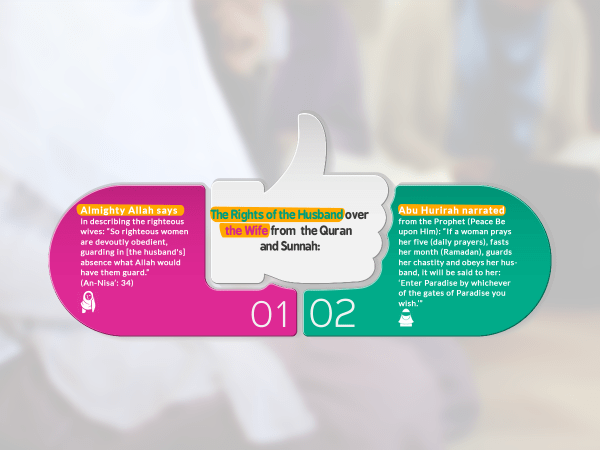
The Rights of the Husband over the Wife from the Quran and Sunnah
The Rights of the Husband over the Wife from the Quran and Sunnah: _Almighty Allah says in describing the righteous wives: “So righteous women are devoutly obedient, guarding in [the husband's] absence what Allah would have them guard.” (An-Nisa’ : 34) _Abu Hurirah narrated from the Prophet (Peace Be upon Him): “If a woman prays her five (daily prayers), fasts her month (Ramadan), guards her chastity and obeys her husband, it will be said to her: ‘ Enter Paradise by whichever of the gates of Paradise you wish.’”
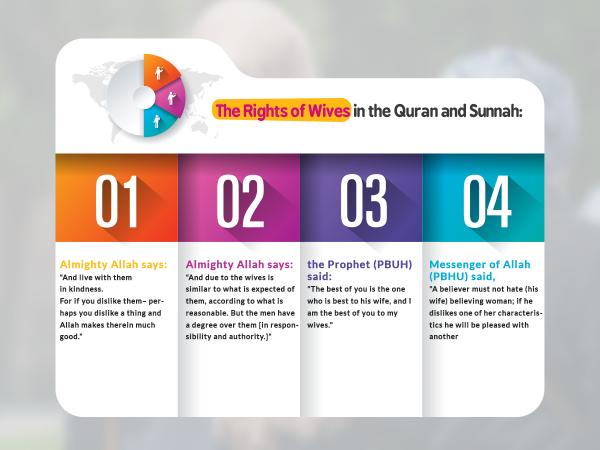
The Rights of Wives in the Quran and Sunnah
The Rights of Wives in the Quran and Sunnah: - Almighty Allah says: “And live with them in kindness. For if you dislike them – perhaps you dislike a thing and Allah makes therein much good.” 5 - Almighty Allah says: “And due to the wives is similar to what is expected of them, according to what is reasonable. Butthe men have a degree over them [in responsibility and authority.]”- the Prophet (PBUH) said: "The best of you is the one who is best to his wife, and I am the best of you to my wives." - Messenger of Allah (PBHU) said, "A believer must not hate (his wife) believing woman; if he dislikes one of her characteristics he will be pleased with another".
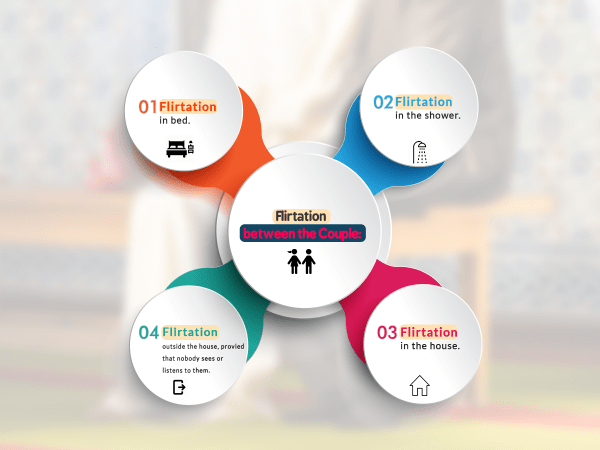
Flirtation between the Couple
Flirtation between the Couple: - Flirtation in bed. - Flirtation in the shower. - Flirtation in the house. - Flirtation outside the house, provided that nobody sees or listens to them.

The Manners of the Wedding Nights
The Manners of the Wedding Nights: - The groom should be nice and kind to the bride and talk to her so that she does not feel shy. This removes any feelings of discomfort and brings hearts together. - It is also one of the prophetic traditions the groom places his hand on the bride’ s head and prays for her.
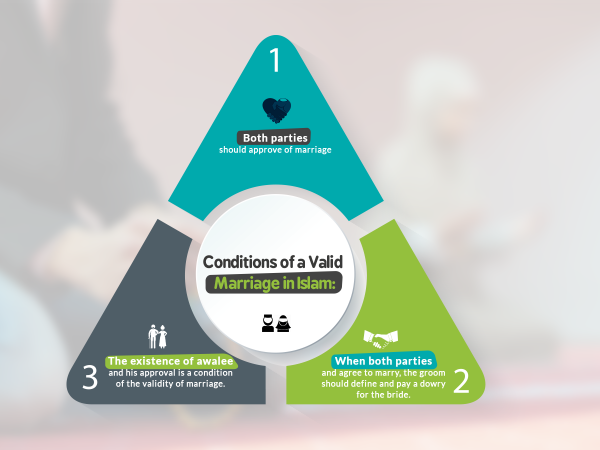
Conditions of a Valid Marriage in Islam
Conditions of a Valid Marriage in Islam: - Both parties should approve of marriage. - The existence of a walee and his approval is a condition ofthe validity of marriage. - When both parties agree to marry, the groom should define and pay a dowry for the bride.
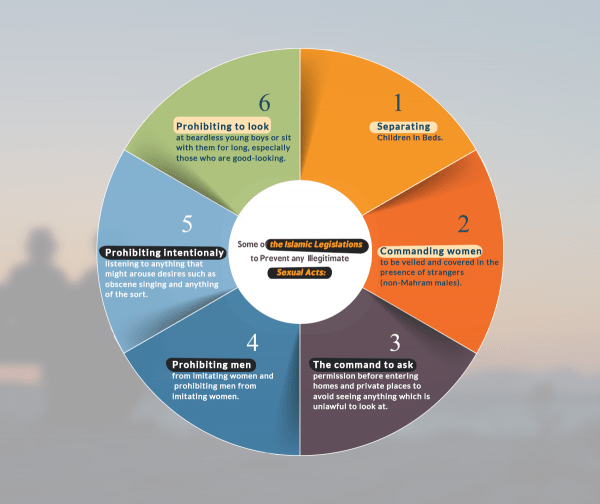
Some of the Islamic Legislations to Prevent any Illegitimate Sexual Act
Some of the Islamic Legislations to Prevent any Illegitimate Sexual Acts: - Separating Children in Beds. - Commanding women to be veiled and covered in the presence of strangers (non-Mahram males). - The command to ask permission before entering homes and private places to avoid seeing anything which is unlawful to look at. - Prohibiting men from imitating women and prohibiting men from imitating women. - Prohibiting intentionally listening to anything that might arouse desires such as obscene singing and anything of the sort.- Prohibiting to look at beardless young boys or sit with them for long, especially those who are good-looking.
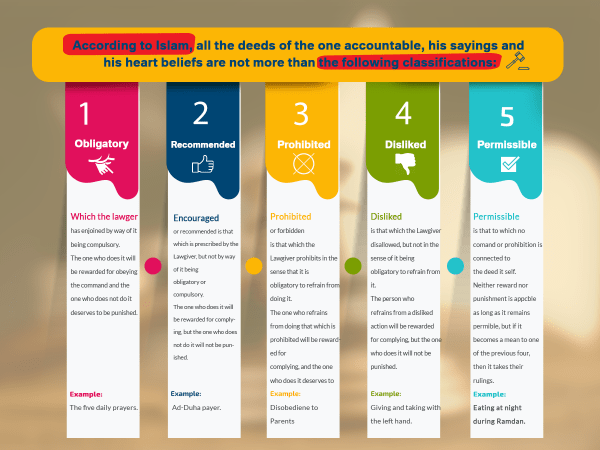
According to Islam, all the deeds of the one accountable, his sayings and his heart beliefs are not more than the following classifications
According to Islam, all the deeds of the one accountable, his sayings and his heart beliefs are not more than the following classifications Fard or Waji b (Obligatory) Which the lawgiver has enjoined by way of it being compulsory. The one who does it will be rewarded for obeying the command and the one who does not do it deserves to be punished. Example: The five daily prayers. Mustahab (Recommended) Encouraged or recommended is that which is prescribed by the Lawgiver, but not by way of it being obligatory or compulsory. The one who does it will be rewarded for complying, but the one who does not do it will not be punished. Example: Ad- Duha payer. Haram (Prohibited) Prohibited or forbidden is that which the Lawgiver prohibits in the sense that it is obligatory to refrain from doing It The one who refrains from doing that which is prohibited will be rewarded for complying, and the one who does it deserves to be Punished Example: Disobedien e to Parents. Makruh (Disliked) Disliked is that which the Lawgiver disallowed, but not in the sense of it being obligatory to refrain from It The person who refrains from a disliked action will be rewarded for complying, but the one who does it will not be punished Example: Giving and taking with the left Hand. Mubah (Permissible) Permissible is that to which no command or prohibition is connected to the deed Itself Neither reward nor punishment is applicable as long as it remains permissible, but if it becomes a mean to one of the previous four, then it takes their rulings. Example: Eating at night during Ramadan.
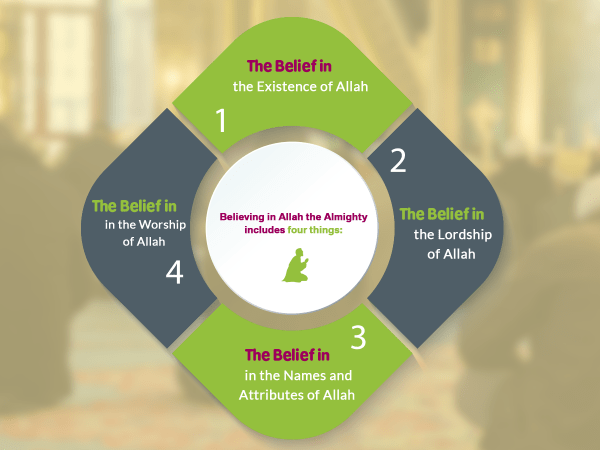
Believing in Allah the Almighty includes four things
Believing in Allah the Almighty includes four things: 1-The Belief in the Existence of Allah 2-The Belief in the Lordship of Allah 3-The Belief in the Names and Attributes of Allah 4-The Belief in the Worship of Allah
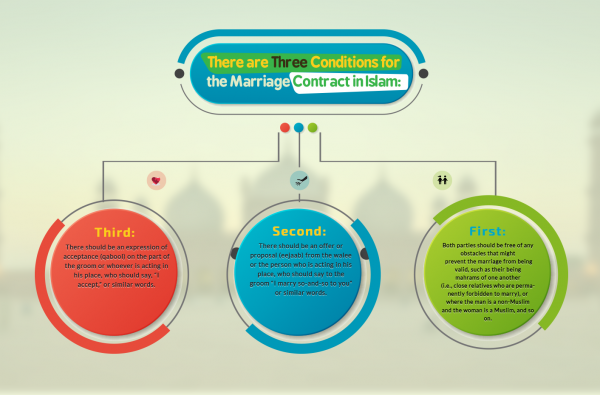
There are Three Conditions for the Marriage Contract in Islam
There are Three Conditions for the Marriage Contract in Islam Tagged In: Women in Islam There are Three Conditions for the Marriage Contract in Islam:First: Both parties should be free of any obstacles that might prevent the marriage from being valid, such as their being mahrams of one another (i.e., close relatives who are permanently forbidden to marry), or where the man is a non-Muslim and the woman is a Muslim, and so on. Second: There shoul
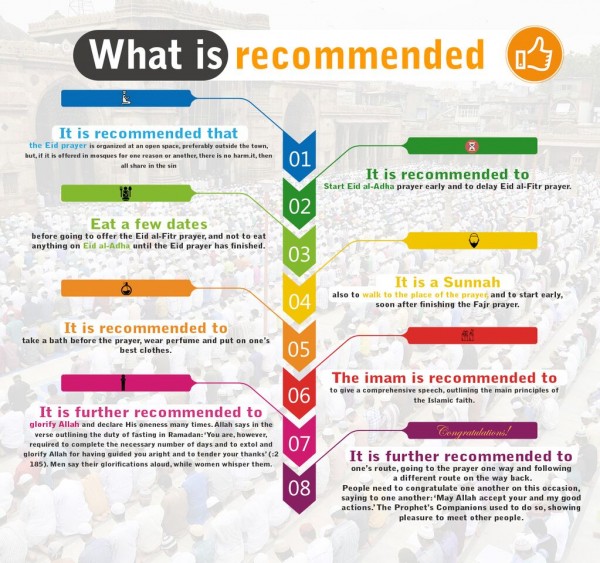
What is recommended !
What is recommended! It is recommended that the 1-Eid prayer is organized at an open space ,preferably outside the town ,but ,it is offered in mosques for one reasons or another , there is no harm it, then all share in the sin 2-It is recommended to start Eid al-Adha prayer and to delay Eid al-Fitr prayer 3-Eat a few dates Before going to offer the Eid al-Fitr prayer , and not to eat anything on Eid al-Adha until the Eid prayer has finished . 4-It is Sunnah also to walk to the place of the prayer ,and to start early soon after finishing the Fajr prayer. 5-It is recommended to take a bath before the prayer ,wear perfume and put on one’s best clothes. 6-The imam is recommended to Give a comprehensive speech outlining the main principles of the islamic faith. 7-It is further recommended to Glorify Alla and declare His oneness many times .Allah says in the verse outlining the duty of fasting in Ramadan :’You’re,however,required to complete the necessary number of days and to extol and glorify Allah for having guided you aright and to tender your thanks ‘ (2:185).Men say the glorifications aloud,while women whisper them. 8-It is further recommended to One’s route ,going the prayer one way and following a different route on the way back. People need to congratulate one another on this occasion,saying to one another : ‘ May Allah accept your and my good actions .’The Prophet’s Companions used to do so , showing pleasure to meet other people.
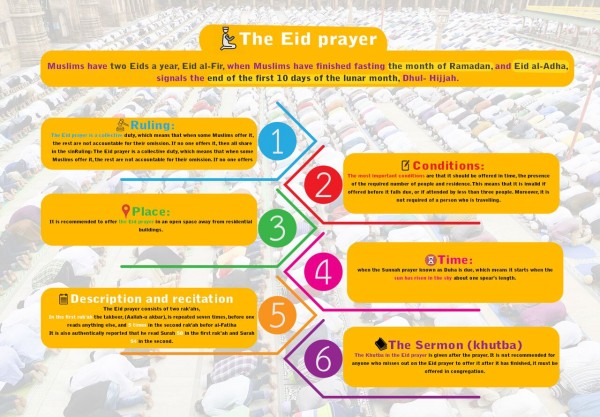
The Eid Prayer
The Eid Prayer Muslims have two Eids a year,Eid al-Fitr,when Muslims have finished fasting the month of Ramadan, and Eid al-Adha ,signals the end of the first 10 days of the lunar month, Dhul-Hijjah 1-Ruling: The Eid prayer is a collective duty, which means that when some Muslims offer it ,the rest are not accountable for their omission .If no one offers it ,then all share in the sinRuling 2-Conditions: The most important conditions are that it should be offered in time ,the presence of the required number of people and residence .This means that it is invalid if offered before it falls due, or if attended by less than three people .Moreover,it is not required for a person who is travelling 3-Place: It is recommended to offer the Eid prayer in an open space away from residential buildings. 4-Time: When the Sunnah prayer known as Duha is due , which means it starts when the sun has risen in the sky about one spear’s length. 5-Description and Recitation: The Eid prayers consists of two Rak’ahs, In the first rak’ah the Takbeer ,(Aallah-u Akbar),is repeated seven times ,before one reads anything else , and 5 times in the second rak’ah before al-Fatiha It is also authentically reported that he read surah 50 in the first rak’ah and surah 54 in the second. 6-The Sermon(Khutba) The Khutba in the Eid prayer is given after the prayer .It is not recommended for anyone who misses out on the Eid prayer to offer it after it has finished , it must be offered in congregation.
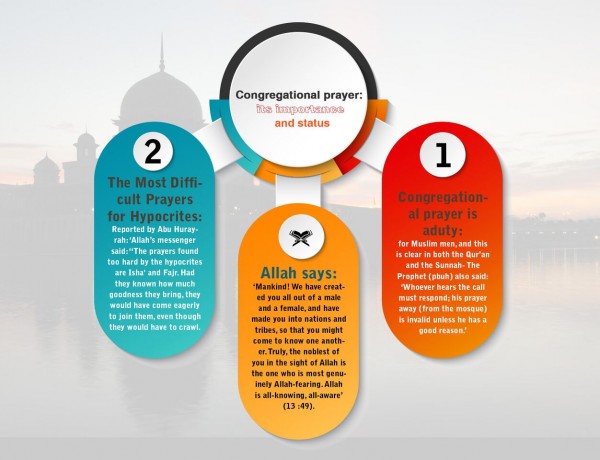
Congregational prayer: its importance and status
Congregational prayer: its importance and status 1-Congregational prayer is a duty : For Muslim men,and this is clear in both in the Quran and the Sunnah, the prophet (pbuh) also said: whoever hears the call must respond ; his prayer (away from the mosque) is invalid unless he has a good reason. 2-The most difficult Prayers for Hypocrites: Reported by Abu Hurayrah:’Allah’s messenger said :”the prayers found too hard by the hypocrites are Isha’ and Fajr .Had they known how much godness they bring, they would have come eagerly to join them ,even though they would have to crawl Allah says: ‘Mankind! We’ve created you out of a male and a female ,and have made you nations and tribes ,so that you might come to know one another .Truly, the noblest of you in the sight of Allah is the one who is most genuinely Allah-fearing.Allah is all-knowing.all-aware’ (13:49).
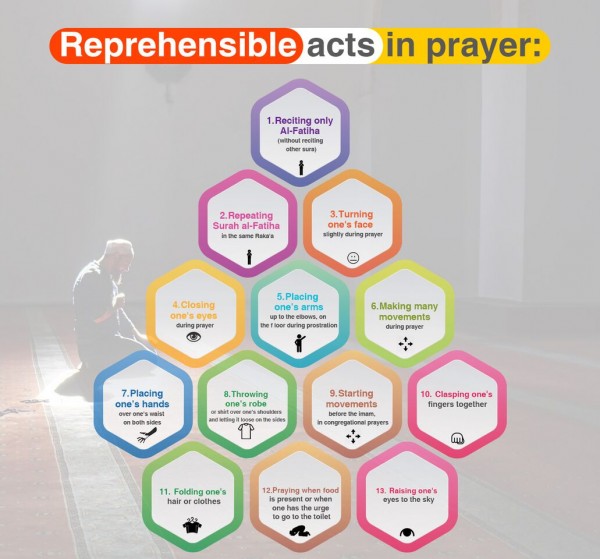
Reprehensible acts in prayer
Reprehensible acts in prayer: 1-Reciting only Al-Fatiha (without reciting other sura) 2-Repeating Surah al-Fatiha In the same Raka’a 3-Turning One’s Face Slightly during prayer 4-Closing one’s eyes during prayer 5-Placing one’s eyes Up to the elbows on the floor during prostration 6- Making many movements during prayers 7-Placing one’s hands over one’s waist on both sides 8-Throwing one’s robe or shirt over one’s shoulders and letting it loose on the sides 9-starting movements before the imam, in congregational prayers 10-Clasping one’s fingers together 11-Folding one’s hair or clothes 12-Praying when food is present or when one has the urge to go to the toilet 13-Raising one’s eyes to the sky
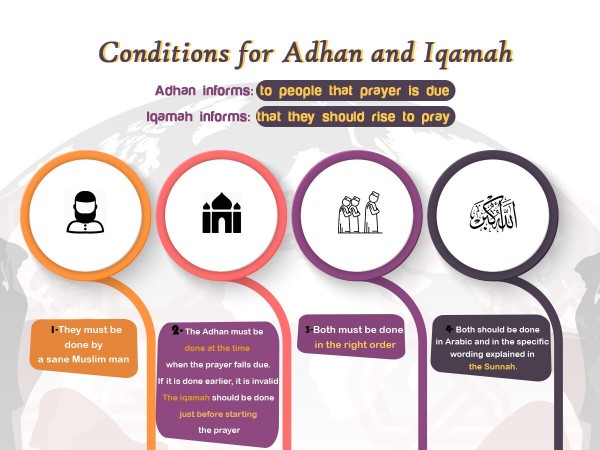
Conditions for Adhan and Iqamah
Conditions for Adhan and Iqamah Adhan informs:to people that prayer is due Iqamah informs:that the should rise to pray 1-They must be done by a sane muslim man 2-The Adhan must be done at the time when the prayer falls due. If it is done earlier, it is invalid The Iqamah should be done just before starting the prayer 3-Both must be done in the right order 4-Both should be done in Arabic and in the specific wording explained in the Sunnah
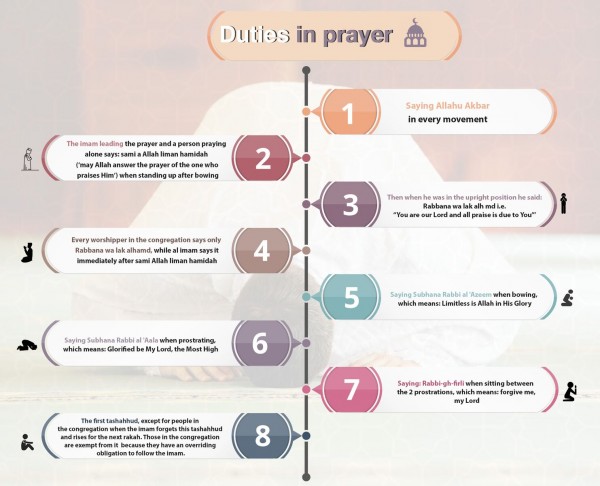
Duties in prayer
Duties in prayer 1-Saying Allahu Akbar in every moment 2-The imam leading the prayer and a person praying alone says : sami a Allahu liman hamidah (`may Allah answer the prayer of the one who praises Him`) When standing up after bowing 3-Then when he was in the upright position he said: Rabbana wa lak alhamd i.e “You’re our lord and our praise is due to You” 4-Every worshipper in the congregation says only Rabbana wa lak alhamd, while al imam says it immediately after sami Allah liman hamidah 5-Saying Subhana Rabbi al’Azeem when bowing which means :Limitless is Allah in His Glory 6-Saying subhana Rabbi al’Aala when prostrating, which means : Glorified be my Lord, the Most High 7-Saying; Rabbi-gh-firli while sitting between the two prostrations ,which means :forgive me , my Lord 8-The first tashahhud except for people in the congregation when the imam forgets this tashahhud and rises for the next rakah . Those in the congregation are exempt from it because because they have an overriding obligation to follow the imam
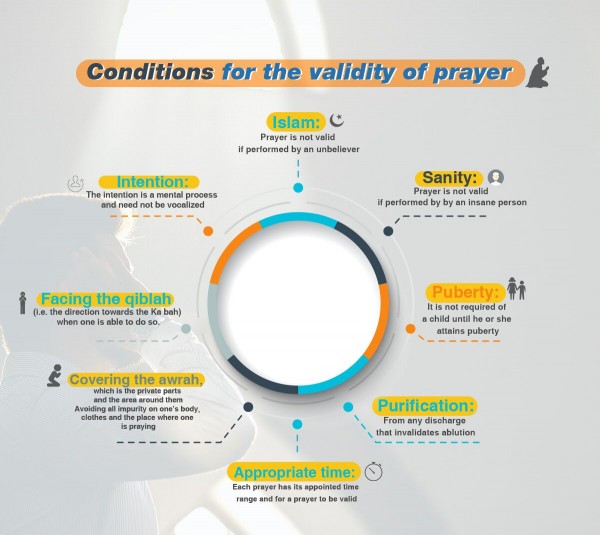
Conditions for the validity of prayer
Conditions for the validity of prayer Islam: Prayer is not valid if performed by an unbeliever Intention: The intention is a mental process and need not to be vocalized Facing the qiblah: (i.e the direction towards the Ka bah) when one is able to do so Covering the awrah: Which is the private parts and the area around them avoiding all impurity on one’s body ,clothes and the place where one is praying Appropriate time: Each prayer has its appointed time range and for a prayer to be valid Purification: From any discharge that invalidates ablution Puberty: It is not required for child until he or she attains puberty Sanity: Prayer is not valid if performed by an insane person
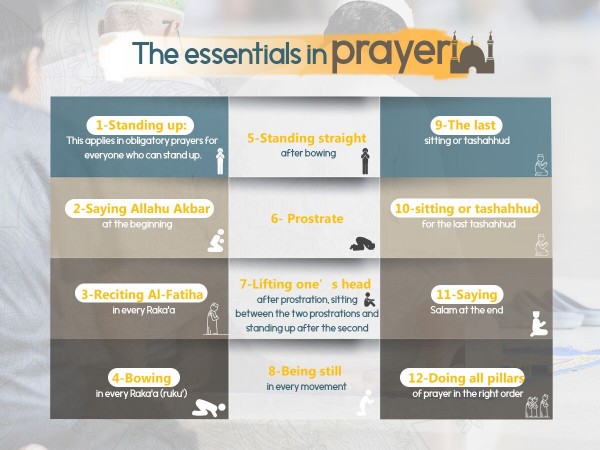
The essentials of prayers
The essentials of prayers 1-Standing up: This applies on obligatory prayers for every one who can stand up. 2-Saying Allahu Akbar At the beginnig 3-Reciting Al-Fatiha in every Raka’a 4-Bowing in every Raka’a (ruku’) 5-Standing straight after bowing 6-Prostrate 7-Lifting one’s head after prostration , sitting between the two prostrations and standing up after the second 8-Being still In every moment 9-The last Sitting for tashahhud 10-Sitting for Tashahhud For the last tashahhud 11-Saying Salam at the end 12-Doing all pillars Of prayer in the right order
